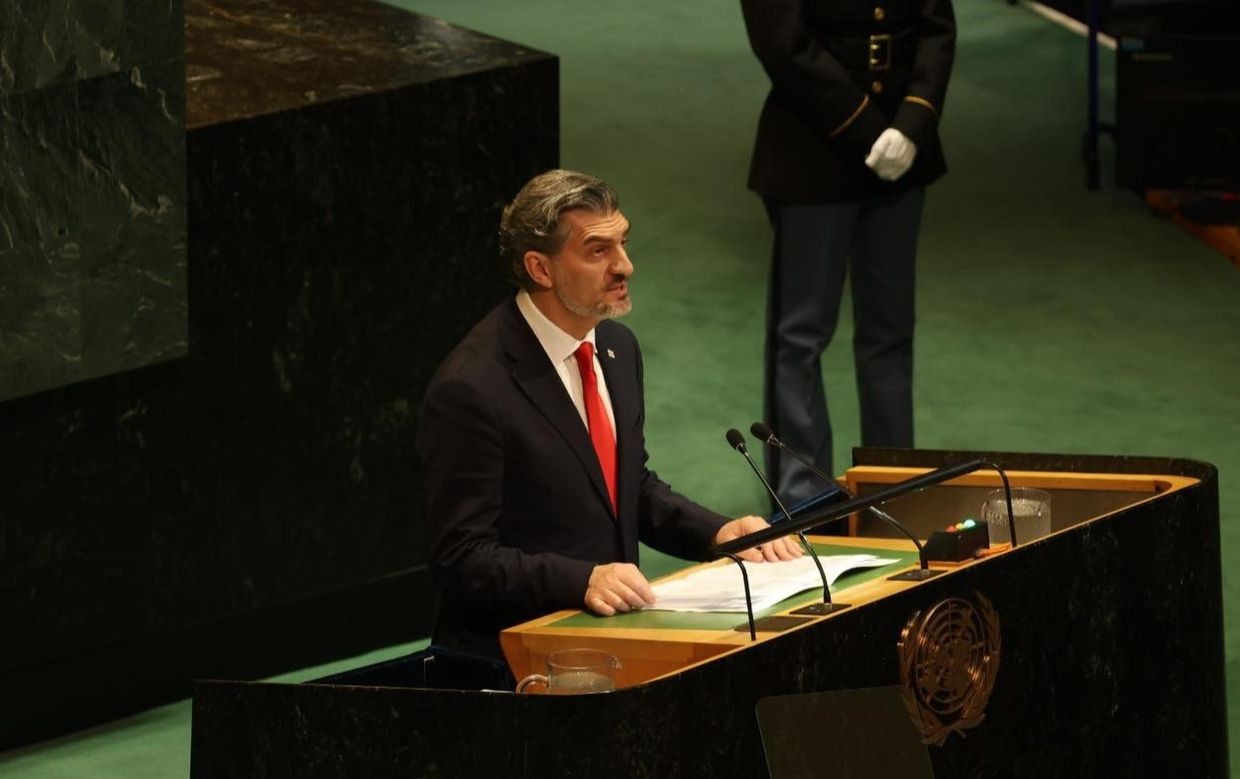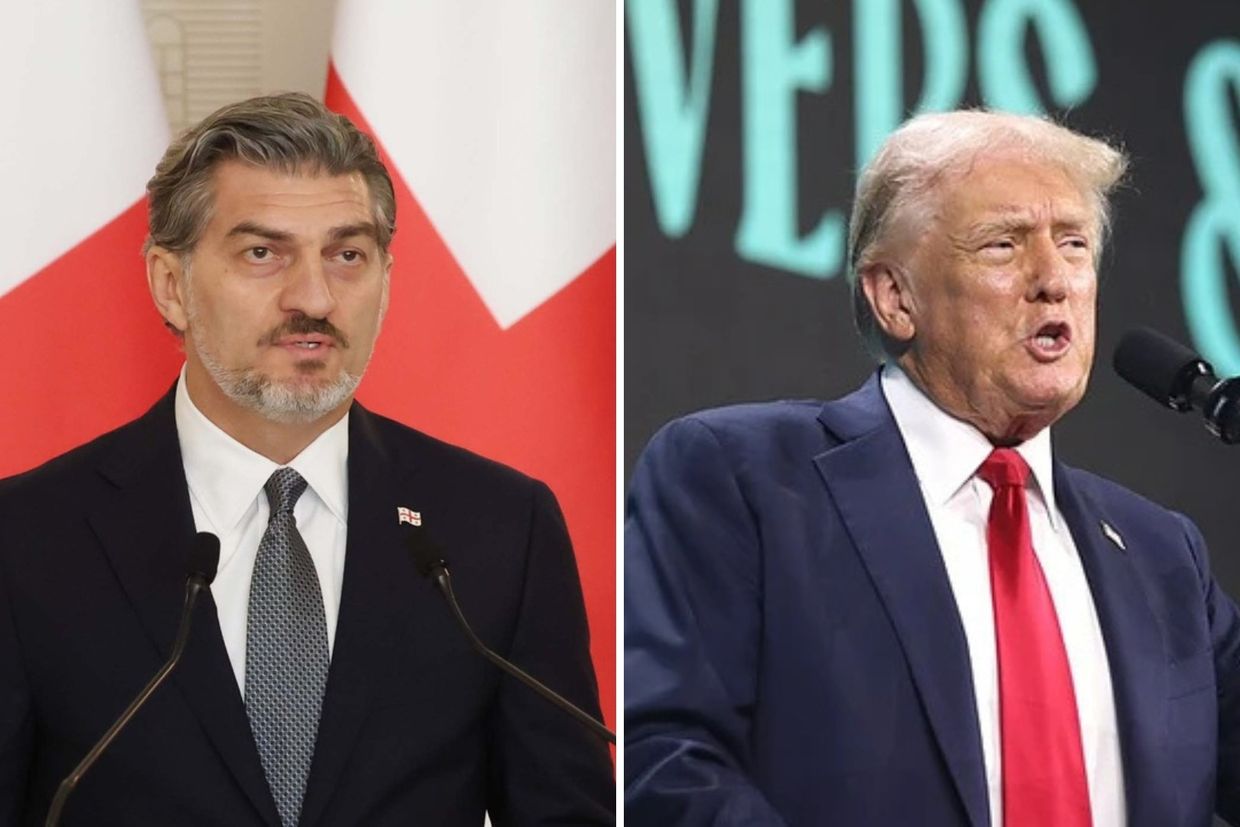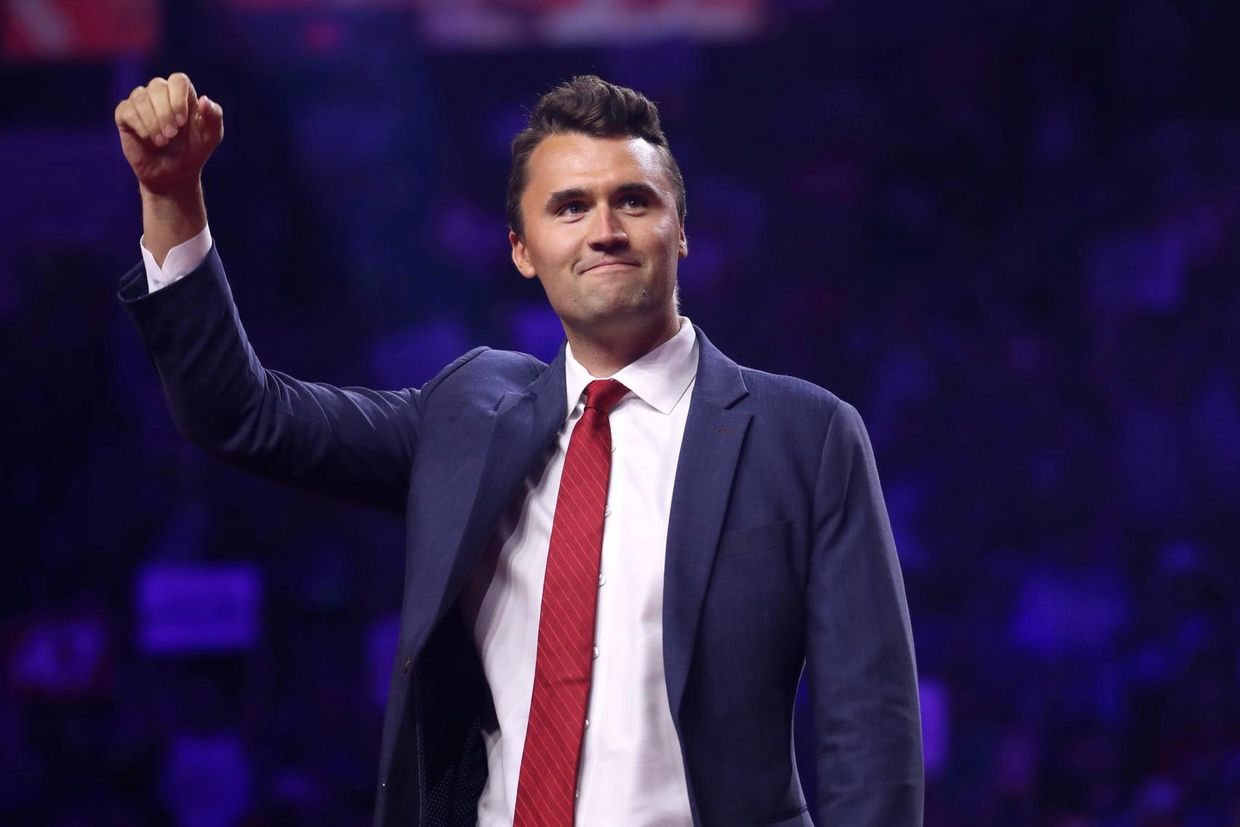
Georgian President Mikheil Kavelashvili addressed the 80th UN General Assembly in New York. He largely avoided the harsh rhetoric recently used by the ruling party against its international critics, but emphasised that Georgians will not tolerate ‘blackmail’, while barely making any direct references to Russia.
Kavelashvili opened his 10-minute address, fully in Georgian, by highlighting Georgia’s history, culture, and national identity, emphasising ‘tolerance, openness to outsiders, harmonious coexistence, and diversity’, and noting that the Georgian people ‘understand both the cost of war and the value of freedom and peace’.
‘In a rapidly changing geopolitical landscape and amid unprecedented global challenges — including ongoing conflicts, climate change, ideological polarisation, cultural alienation, and war-induced humanitarian crises — Georgia stands firmly as a guardian of dialogue, peace, stability, and sustainable development’, he said.
Kavelashvili did not mention the conspiracy claims promoted by the Georgian Dream government, such as the ‘deep state’ or ‘global war party’, which the ruling party claims are trying to drag Georgia into a war with Russia.
However, he stressed that ‘what the Georgian people will not accept is the language of ultimatums, blackmail, and intimidation’, apparently echoing Georgian Dream’s allegations that Georgia was being blackmailed by its traditional partners, including EU leadership, in response to their criticism of the country’s democratic backsliding.
‘We are open to any dialogue and cooperation, but at the same time we demand fair and dignified treatment’, Kavelashvili added, noting that the Georgian government has made efforts ‘to improve the protection of human rights’.
Before addressing Russia’s full-scale war in Ukraine, Kavelashvili noted that the Georgian authorities’ ‘core philosophy remains’ the preservation of peace and avoidance of war.
He then referred to the ‘bloody war in Ukraine’ and the ‘bitter experience’ Georgia endured during the August 2008 war, emphasising that ‘we understand all too well the pain the Ukrainian people are experiencing today’.
‘As always, Georgia expresses firm and unwavering support for the Ukrainian people’, he added.

In this part of his speech — as in his entire address — Kavelashvili mentioned Russia only once, when he welcomed US President Donald Trump’s efforts to ‘bring the bloody Russia–Ukraine war to a swift end’.
Kavelashvili made no direct remarks about the Ukrainian government, with which Georgia once enjoyed friendly relations that have sharply deteriorated since Russia’s full-scale invasion of Ukraine — a situation complicated by the large presence of Georgian volunteer fighters in Ukraine, Georgia’s own democratic backsliding, and President Volodymyr Zelenskyi’s ties to imprisoned former President Mikheil Saakashvili and his United National Movement (UNM) party.
In his speech, Kavelashvili also addressed Georgia’s stance in the South Caucasus, noting that the country seeks to contribute to the region’s transformation and ‘turn it from a conflict zone into a space for dialogue between civilizations and economic prosperity’. In this context, he praised Trump’s peace initiative between Armenia and Azerbaijan.
Kavelashvili also addressed Abkhazians and Ossetians, emphasising that Georgia’s ‘cultural code has not changed’ and that ‘for us, diversity is not a problem but remains an essential formula for our existence’.
‘[…] Across the occupation line, you will always be met with an open heart and outstretched hand’, he added.
At the close of his speech, Kavelashvili thanked the international community for supporting Georgia’s territorial integrity and sovereignty, and called on the UN to ‘ensure our planet’s transition to a peaceful, stable, and just multipolar international order’.
‘We are ready and open, taking our national interests into account, to engage in dialogue on issues of global and regional significance with every country’, he concluded.
After his speech, Kavelashvili told journalists that he met Trump at a dinner hosted by the US president and expressed his desire to start the Georgian-US relationship ‘on a new page’.
‘He responded that he would look into the matter. He promised to follow up and get in touch’, Kavelashvili said.
Both Kavelashvili and Prime Minister Irakli Kobakhidze had previously expressed public disappointment over what they saw as the Trump administration’s lack of attention to Georgia.

Kavelashvili instead of Kobakhidze
It was announced in early September that President Kavelashvili, rather than Kobakhidze, would address the UN General Assembly.
At the time, Kobakhidze explained that it was ‘preferable’ for the president to attend for various reasons, including a technical reason: in addition to serving as prime minister, he was also leading the ruling party’s election headquarters ahead of the 4 October municipal vote.
‘Accordingly, it is also physically difficult for me to visit the UN’, Kobakhidze said.
Kavelashvili was sworn in December 2024 as the first president in Georgia’s history to be elected by an electoral college rather than by popular vote.
The vote has been widely dismissed by local stakeholders as illegitimate, along with the new iteration of parliament, which was formed as a result of the controversial parliamentary elections held two months earlier, marked by widespread violations of vote buying and breaches of voter secrecy.
A former footballer, Kavelashvili entered politics as an MP for Georgian Dream in 2016 and was among those with the sharpest words for Georgia’s Western partners over their criticism of the ruling party’s anti-democratic steps and lack of institutional reforms. Kavelashvili was also among the authors of Georgia’s foreign agent law.











